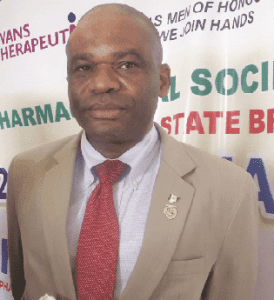The Pharmacists Council of Nigeria (PCN) has tasked parents, religious leaders, law enforcement agencies and other stakeholders to stop drug abuse in the society by sensitizing Nigerians on its inherent dangers.
 PCN Registrar, Mr. Elijah Mohammed, in an interview on Wednesday in Abuja on the sideline of an awareness campaign organised by the Pharmaceutical Society of Nigeria (PSN).
PCN Registrar, Mr. Elijah Mohammed, in an interview on Wednesday in Abuja on the sideline of an awareness campaign organised by the Pharmaceutical Society of Nigeria (PSN).
Mr. Mohammed said;
“Drug abuse control is not just the responsibility of health professionals but also that of the government as well as communities, families, schools, civil societies and religious organisations.
“Through enlightenment by parents, guardians, teachers, policy makers and youths the development of drug abuse/misuse and risky behaviours can be controlled and prevented.”
He enjoined the clergy, religious leaders, law enforcement agencies to intensify efforts at sensitizing the public especially the younger citizens.
He further added “It is our collective their responsibility to sensitize and educate the populace against drug and substance abuse; through such efforts the society will witness remarkable decrease in the prevalence rate of this menace,’’ according to him.
Mohammed, who said that drug abuse was an act consciously perpetrated by mostly the young ones, however urged parents to be at the forefront in educating their children and wards on the dangers associated with the menace.
He decried the prevalence rate of the menace across the globe, adding that in the early 60s, 70s and 80s the reverse was the case.
The registrar pointed out that large number of mental or psychiatric cases emanated from drug abuse.
While identifying the menace as a socio-economic problem, Mohammed also attributed the rise in crime in society to drug and substance abuse.
Citing the recently recovered Boko Haram dent by the military at Sambisa forest in Borno, Mohammed noted that most prominent relics found were hypodermic syringes, narcotic analgesic, empty packs of Tramadol capsules and other substances of abuse.
According to him, this is an indication that criminals, terrorists and all people that commit one crime or the other are under the influence of drugs.
He therefore called for all hands to be on deck in order to successfully address the social menace.
“The consequence of drug abuse is that it increases crime rate, morbidity and mortality particularly it is a danger to mental health.
“This is because the end result of substance abuse is that it damages the brain and if the brain is damaged a lot of organs in the body like the liver and kidney will be damaged.
“The effects are monumental and because of the wide range of it, it has become an epidemic.
“Drug abuse is an epidemic of global proportion in the sense that today you see large number of psychiatric cases emanating from drug abuse which was very rare in the early 60s, 70s and 80s.
“Today anywhere you go you will always see young people that are mad as a result of drug and substance abuse.
“Drug abuse is responsible for large number of psychiatric problems not organic brain problems,’’ Mohammed said.
On this year’s WPD theme, Mohammed said it implied that the global awareness for the year focused on the extensive expertise that pharmacists have and put to use every day to ensure better patient health.
Mohammed said: “This expertise is applied through science and research, educating the next generation through transforming patient needs to service.
“The theme became necessary because as one of the most accessible healthcare professionals globally, we use our learning to protect health and prevent illness.
“The theme also provides an opportunity to showcase the relationship between pharmacy and other areas of the healthcare system.”





